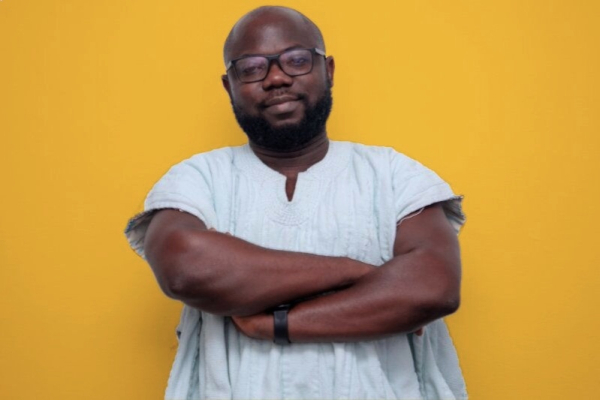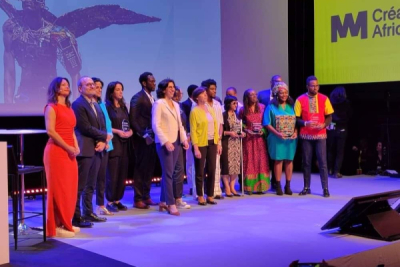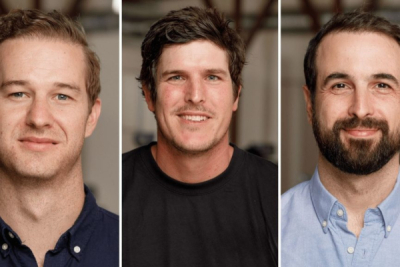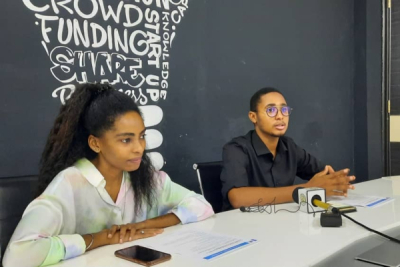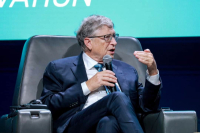According to the UN, climate change is one of the major challenges of our times. More so in Africa, which is bearing the highest cost despite accounting for the lowest carbon emissions. In Ghana, a tech entrepreneur wants to contribute to the reduction of carbon emissions, therefore helping combat climate change. Through Solar Taxi, he ensures a clean and sustainable environment with taxis that use renewable energy.
Ghanaian tech entrepreneur George Kwadwo Appiah (photo) is the CEO and one of the co-founders of Solar Taxi, a local transport services company offering solar-powered vehicles.
He graduated from the Kwame Nkrumah University of Science and Technology (KNUST), in 2016, earning a master's degree in renewable energy technology. The same year, he earned a master’s in business administration from the Edinburgh Business School.
His company was founded in 2018. It provides locally assembled electric motorcycles, tricycles, and cars, as well as access to solar charging stations. Doing so, it aims to reduce air pollution caused by gasoline-powered vehicles, offer Ghanaians an affordable transport alternative, and create jobs for young people.
It also has a training academy where Ghanaians are taught how to drive and maintain electric vehicles. On September 21, 2023, it was announced among the selectees for the Google for Startups Accelerator: Climate Change.
Currently, its CEO, George Kwadwo Appiah, is a research assistant at KNUST's The Energy Center. In 2014, he founded Ghana Hubs Network, a network of Ghanaian innovation centers. He is also the CEO of QuadSolar, a solar system installation company, and Executive Director of Ghana Tech Lab, an ecosystem that serves as a digital innovation space aimed at accelerating digital skills and digital entrepreneurship in Ghana.
In 2015, he co-founded Kumasi Hive, a coworking, training, and incubation space that aims to promote social and technological entrepreneurship in Ghana. Kumasi Hive offers young innovators access to equipment, mentors, training, and funding opportunities to develop their ideas and solutions. Solar Taxi was founded through Kumasi Hive.
George Kwadwo Appiah received the Academic/Research Excellence Award (student category) in 2014. His company, Solar Taxi, has also attracted international attention. It was featured by The Org network as one of three African electromobility startups to watch in 2023.
Melchior Koba
To facilitate the organization of events and the acquisition of tickets by the public, an Ivorian tech entrepreneur has developed a technological solution.
SkanTicket is a technological solution developed by Ivorian startup Skan Technologies. On the one hand, it enables event promoters to create tailor-made events, offer tickets and/or invitations online, promote the event, and manage access control on the big day. On the other hand, it offers people the chance to purchase tickets for various events online. The startup was launched by Nancy Aphey Anicet Amani.
The solution has a mobile app for Android and iOS devices. Once downloaded, the app allows users to create an account by entering their e-mail address and a password. After that, they create events or buy tickets. For each event created, SkanTicket provides a minisite that the promoter customizes with the event logo, images, etc.
If the promoter already has a website or has one planned for the event, he/she can integrate the ticketing service from his organizer's space, by exporting the widget with a simple copy and paste. No special IT skill is needed to use the tool. Once the tickets have gone on sale, sellers can receive the proceeds of the sales on the 1st and 16th day of every month through bank transfer.
SkanTicket, which integrates mobile money payment systems from telecom operators MTN and Orange, collects 5% of all sales. It provides a USSD code to enable users with no smartphone to also buy tickets.
Since its launch, the Android version of its mobile application has already been downloaded more than 10,000 times. In 2023, the startup was among the ten winners of the AFD Digital Challenge.
Adoni Conrad Quenum
The sheer volume of high-speed telecom infrastructure deployed in Africa since 2010 has made the continent a market with high financial potential for many international tech groups. But these investments appear to be underexploited.
Over the past ten years, the number of people covered by fixed broadband in Africa has remained below 10%, despite the considerable financial investments made during this period. In its "Global Connectivity Report 2022", the International Telecommunication Union (ITU) reports that in 2021, only seven out of every hundred households were covered by the service, compared with 82% for mobile. This is the lowest level worldwide and has not changed since. In Europe, the coverage rate is 96%, compared with 88% and 86% respectively in the Asia-Pacific and Americas.
In terms of subscriptions, only 1% of consumers had subscribed to the service on the continent by 2021. This was also the lowest level worldwide. In Europe, the figure was 35%, compared with 23% and 17% in the Americas and Asia-Pacific respectively, according to the ITU.
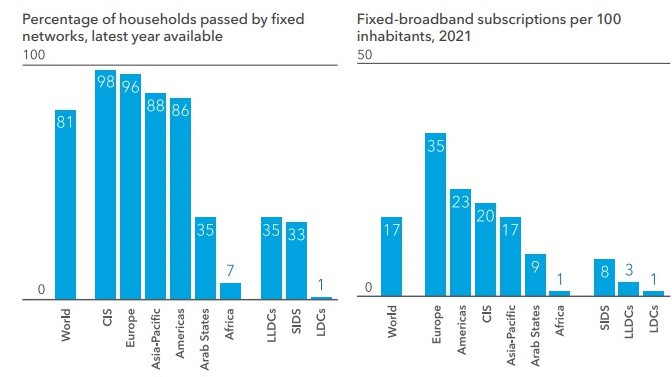
Worldwide fixed broadband coverage (Source: ITU, 2021)
According to the ITU, the lag in fixed broadband is explained by consumer preference in terms of usage. They opt for mobile, which is more flexible and less expensive. For telecom operators, the choice is explained by investment costs. "Fixed broadband networks are very costly to deploy, maintain, and upgrade, depending on the geography and extent of the territory to be covered," says the ITU. At 17.9% of monthly gross national income per capita, fixed broadband access costs in Africa are the most expensive in the world. Meanwhile, the ITU recommends less than 2%.
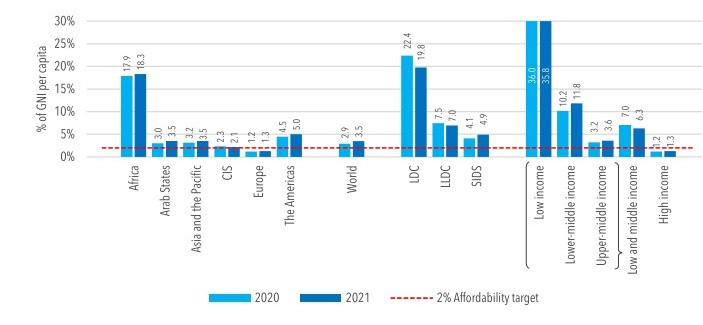
Fixed broadband access costs in 2021 (Source: ITU)
Since 2020, Africa has recorded the fastest annual growth rate in Internet transmission capacity in the world, according to the report "The State of Broadband 2023 Digital Connectivity: A Transformative Opportunity" by the United Nations Broadband Commission. The continent is already home to more than 25 submarine fiber optic systems and is covered by almost 1.2 million km of terrestrial fiber optics. But only 25% of the population lives within 10 km of a fiber optic network.
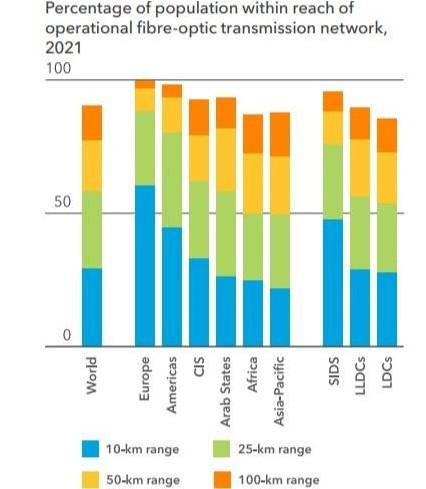
Percentage of population near a fiber optic network (Source: ITU)Worldwide, only 2.3 billion people (29%) were living within 10 kilometers of a fiber optic network in 2021. In Europe, over 60% of the population lives within 10 kilometers of a fiber-optic network, nearly 47% in the Americas, and 22% in the Asia-Pacific region.
“Although more people use mobile networks than fixed networks to connect to the Internet, the latter remains important. For example,fixed-broadband networks generally have a higher data capacity than mobile networks, and download limits are higher than similarly priced mobile-broadband plans. They are faster and are more reliable than 3G or 4G networks, making them more suited for high-bandwidth activities such as games and video calls," explains the Union.
Broadband internet is more strategic for small and medium-sized businesses. In its survey "The State of Broadband: Accelerating Broadband for New Realities September 2022," the Broadband Commission for Sustainable Development conducted a survey of informal businesses in nine African countries, revealing low levels of ICT use. "Internet use for business purposes was 7% on average, ranging from 24% in South Africa to 1% in Rwanda. Computer ownership is also low: over 90% of businesses surveyed in Ghana, Kenya, Mozambique, Nigeria, Rwanda, Tanzania, and Uganda said they did not have one," the survey shows
While a one-person micro-business may find that a smartphone with wireless access is sufficient to carry out its activities, particularly for online sales on social media, many businesses still feel that they don't need Internet access or a computer. Yet, fixed broadband can improve operational and commercial activities, as the Covid-19 crisis demonstrated.
In the report "Economic impact of broadband in LDCs, LLDCs, and SIDS: An empirical study, 2019", the ITU estimates that a 10% increase in fixed broadband penetration would increase gross domestic product per capita by 2.0 to 2.3%.
Muriel Edjo
Last week, French development agency AFD announced the ten African startups that won the 2023 edition of the AFD Digital Challenge. They are Adinkra (Cameroon), Colorfol (Cameroon), Vortex (Nigeria), Aflamin (Morocco), IAMNATIV (Uganda), SkanTicket (Ivory Coast), ShazaCin (South Africa), SongBoost (Kenya), AkooBooks (Ghana) and Oroko Radio (Ghana).
Cue, a South African startup developing AI-enabled customer service solutions, announced on Thursday, October 12 the successful completion of a $500,000 funding round. The funds will help enhance its technology, now providing companies with faster customer service thanks to next-generation AI models.
Far from being just a workspace, Com'Work is a community of like-minded entrepreneurs who want to change the Comoros. It offers personalized support tailored to each beneficiary startup’s development stage.
Comoros Coworking (Com'Work) is a modern, creative coworking space and incubator located in downtown Moroni. It was created in 2018 by young entrepreneurs for entrepreneurs.
The incubator offers a variety of services to professionals, associations, and creative agencies wishing to work in a stimulating and collaborative environment. It has 4 individual offices, a coworking open space with 10 workstations, a meeting room, a relaxation room, and two furnished studios.
It regularly organizes training courses, expert meetings, and meet-ups to encourage exchange, networking, and capacity-building among entrepreneurs. It also assists project leaders in their search for financing.
The center offers both pre-incubation and incubation programs. Its pre-incubation program supports entrepreneurs in the process of moving from idea to action. It can be delivered face-to-face over three months or online over six months. The program consists of educational content, thematic workshops, and daily individual coaching.
The incubation program, meanwhile, enables entrepreneurs to explore the market to validate their business model, test the market to acquire the first customers, establish and commit to a financing strategy, and build the start-up team in line with the target market. Program beneficiaries have privileged access to financing and tailor-made training.
In addition to these two programs, Com'Work also offers an à la carte support program to help entrepreneurs develop their projects at their own pace and according to their needs. At the end of the programs, the incubator offers business consulting services in several areas of expertise.
Melchior Koba
Ms. Amira Cheniour pushes the boundaries of innovation to heal the planet and improve the lives of farmers. With Seabex, she demonstrates that agriculture can be a promising sector for Tunisia and Africa.
She got the Seabex idea during a trip to southern Tunisia, where she met a farmer who lost a large part of his date crop to drought. She then decided to put her skills at the service of agriculture, a vital sector for her country, but one facing many challenges.
The company has developed a remote AI-based irrigation monitoring and control system that uses sensors installed on the farms to determine the water and fertilizer needs, enabling farmers to act efficiently.
Seabex also offers a Software as a Service service to farmers, who can access data and recommendations on their smartphones or computers.
Since its creation, Seabex has enjoyed remarkable success, both nationally and internationally. The startup has won several prestigious awards, such as the Orange Prize for Social Entrepreneurship in Africa and the Middle East in 2017, and the Innovation Trophy at the Agreen Startup 2023 competition in the category of startups that collaborate with chambers of agriculture. It was also selected as one of the beneficiaries of the Google for Startups Accelerator: Climate Change program for the Middle East and Africa.
Amira Cheniour began her professional career in 2011 at Orange Tunisia, where she completed an end-of-study internship. She then worked for software publisher I.T.Grapes between 2011 and 2020. She launched Seabex, in 2015, with Taher Mestiri, the founder of I.T.Grapes.
Internationally, she is celebrated for her exceptional career and leadership. She was voted Star-Female Entrepreneur at the 2017 G20 in Berlin and received the Ye Star-Female Entrepreneur award at the Global Inclusion Awards program held in 2017 in Berlin, Germany.
In 2018, she was the winner of the Women in Africa and Social Entrepreneur of the Year in MENA issued by Orange Tunisia. She was selected among 6 winners at the Woman Entrepreneur of the Year Award 2019 final in Paris. She was also on the 2020 edition of the Top 100 Women Entrepreneurs in Tunisia published by The Next Women Tunisia network.
Melchior Koba
The food delivery app was developed by three tech entrepreneurs to help residents benefit from the ongoing tech revolution.
Capsa Food is a solution developed by a Tunisian startup. It enables users to order food online and have it delivered to the location of their choice, at home, at the office, or elsewhere.
Through its mobile application available for both Android and Huawei devices, users create accounts to access its services. The solution lists several restaurants in the city of Gafsa, from fast-food outlets to entities specializing in local dishes.
Once the food choice is made, a user needs to confirm the order and enter the delivery location. The app allows them to track the delivery in real-time and pay once they receive the order. Based on previous orders, it monitors users’ preferences and adapts the restaurants shown to users based on those preferences. It also suggests the nearest restaurants to optimize delivery time.
Capsa Food operates exclusively in Gafsa, a town of less than 100,000 inhabitants located 360 kilometers south of the Tunisian capital, Tunis. The startup's name comes from the town's former name, Capsa. Since its launch earlier this year, the Android version of its mobile application has been downloaded more than 5,000 times.
Adoni Conrad Quenum
For several years now, the Tanzanian government has been implementing initiatives to transform the country digitally. To accelerate the process, authorities are working with specialized partners with proven expertise.
The Estonian Centre for International Development (ESTDEV) and its partners - namely the Finnish Institute of Public Management (HAUS), the German Agency for International Cooperation, and the German Ministry of Digital Transport - recently launched the Digital4Tanzania (D4T) project in Tanzania.
The project, funded to the tune of €2 million by the European Union, aims to support Tanzania's digital transformation by cooperating on e-government reform and connectivity.
"Interest in Estonia’s digitization experience is also great in those African countries that are not Estonia’s priority countries. Of course, we are ready to share our experience of building a digital state and e-governance with all countries. Estonia has a large network of experts, and both we and Tanzania have a lot to learn from this twinning," said Andres Ääremaa, ESTDEV’s Programme Manager for Digital Transformation.
As part of the project, the D4T consortium partners and the Tanzanian Ministry of Information, Communication, and Technology will implement activities in line with D4T objectives.
The activities include capacity building and skills development in government cybersecurity, developing privacy and data protection frameworks, and strengthening data management and governance skills. It also includes the improvement of “skills and capacity in the private sector, particularly within the cybersecurity and privacy and data protection research communities, while addressing the digital gender divide.”
According to the ESTDEV press release, the project contract was signed, last summer, by the Finnish Institute of Public Management and the European Commission delegation in Tanzania. The project is scheduled to run until spring 2026.
Samira Njoya
The funds announced by the Gates Foundation will complement ongoing investments in the use of artificial intelligence to develop the healthcare sector worldwide.
The Bill & Melinda Gates Foundation pledges $30 million to support the development of a new artificial intelligence platform for Africa. American billionaire Bill Gates (photo) made the announcement on Tuesday, October 10, at this year's "Grand Challenges" meeting in Dakar, Senegal.
According to the donors, the platform will provide African scientists and innovators with the technical and operational support they need to turn promising health and development ideas into real, scalable solutions.
It is a step towards ensuring that the benefits of AI are relevant, affordable, and accessible to all and that these essential tools are developed both safely, ethically, and equitably.
"The world needs to make sure that everyone—and not just people who are well-off—benefits from artificial intelligence. Governments and philanthropy will need to play a major role in ensuring that it reduces inequity and doesn’t contribute to it. This is the priority for my own work related to AI," Bill Gates said in an interview last March.
According to the Foundation, this latest investment aligns with its recent focus on funding technological innovation, particularly as it relates to AI, in the world's low- and middle-income countries. Last August, the Foundation announced that it would spend $5 million to fund nearly 50 AI projects in the said countries.
These investments aim to increase funding for healthcare R&D (research and development) worldwide to make development easier and faster and enable the next generation of scientific and technological breakthroughs that are relevant and accessible to all.
According to the Foundation, only 2% of R&D funding is devoted to diseases affecting the world's poorest populations.
More...
He aims to improve access to healthcare services in Africa. With Zinacare, he offers over 20 different tests, ranging from sexually transmitted infections to chronic diseases and even Covid-19.
Philip Mngadi (photo) is a South African serial entrepreneur with a decade of experience building products in Africa and Europe. He is the founder and CEO of Zinacare, a company revolutionizing access to essential health testing services in Africa.
His academic career began at University College Cork, where he graduated with a Bachelor of Laws in 2017. After his studies, he worked for Stripe in Ireland as a payments specialist before embarking on entrepreneurship.
In 2020, he launched Zinacare, allowing access to more than 20 different tests, which range from sexually transmitted infections to chronic diseases and COVID-19. He enables users to order test kits from the Zinacare platform and get them delivered to their homes or offices. Users can also send their samples to Zinacare's partner laboratory, which sends back the results online confidentially and securely. Zinacare also offers medical consultation, prescription, and post-test follow-up services.
Under the leadership of Philip Mngadi, Zinacare has received accreditation from the Health Professions Council of South Africa, the South African Health Products Regulatory Authority, the South African National Accreditation System, and the International Organization for Standardization. In addition, the company succeeded in attracting over 20,000 customers in 2022 and is on track to double the figure in 2023.
In June 2023, the startup was selected by Google to be part of the annual Black Founders Fund cohort in Africa. It has also joined StartUp Health's global community of healthcare founders and investors.
In addition to Zinacare, Philip Mngadi also founded Pago, a low-cost mobile micropayments platform for the informal sector to enable an inclusive economy by digitizing remittances through the use of blockchain technology. The company was incubated by the AlphaCode Incubate initiative in 2018.
In 2019, the serial entrepreneur also founded Tuma, a fintech that enables users to transfer funds from any instant money wallet such as eWallet, CashSend, and Send-iMali, to any bank account in South Africa.
Melchior Koba
The platform is a Moroccan version of the vide dressing concept its founder discovered during her studies in France.
Vesttys is an e-commerce platform developed by a Moroccan startup. On the one hand, it lets users sell old items and, on the other, buy new ones at attractive prices. The Tangier-based startup behind it was founded in 2020 by Mariam Ben Omar.
Defining itself as a vide-dressing platform, Vesttys aims to develop the second-hand market in the Cherifian kingdom.
"During my years of study in France, I realized at one point that I had a shopping addiction, I ended up with several items that I didn't use. Most of them were left with the label. [...] A friend told me about a platform where I could put my clothes up for sale: a sort of virtual dressing room. So I became a seller myself and created my own dressing room. A few years later, I returned to Morocco for good, and that's when I began to realize the importance of this platform in my daily life," explains Mariam Ben Omar.
Vesttys was born from that realization. Currently, it has no mobile app. Unregistered users can nevertheless visit its web platform and check the items available for sale, from traditional and modern clothing to beauty products, children's items, accessories, and more.
To post or buy an item, users need to create a free account with an email address and link a credit card to activate the account.
The platform does not charge commissions on user purchases or sales. It earns money through a feature called “Boost”. This feature allows users to make their dressing rooms or items appear at the forefront. This means that when users search from specific items, the listings of “Boost” subscribers will appear first.
Adoni Conrad Quenum
Egyptian insurtech company Amenli announced on Monday, October 9 the successful completion of a $1 million financing round. The deal was led by Alter Global, a venture capital fund focused on emerging markets, with the participation of Qatar Insurance Group and Digital Ventures Partners. The funds will be used to develop its technology and accelerate growth.
Bolt's current operating license is due to expire in 17 days. Nevertheless, Kenyan authorities are calling on the Estonian company to address lingering issues or cease operations.
Kenya's National Transport and Safety Authority (NTSA) has rejected the renewal of VTC company Bolt's operating license in the country, local media report. The decision follows alleged violations by Bolt, including illegal commissions and booking fees higher than those set by the Ministry of Transport.
"Please note that the Authority is not able to proceed with the renewal of your operator license until the issues raised by drivers and their representatives are satisfactorily addressed and rectified," said Cosmas Ngeso, Deputy Director and Licensing Officer, in the letter sent to Bolt on behalf of NTSA Director General George Njao.
Indeed, the Estonia-based company, which entered Kenya as Taxify in 2016, obtained a license from Transport Network Company on October 28, 2022. At the time, it committed to complying with the regulations in force in the country, in particular the law which stipulates that the commission collected from drivers using the app is set at 18%. Nevertheless, in recent months Bolt has been accused of introducing "illegal" booking fees.
According to the VTC company officials, the booking fee is an additional charge added to each trip. "The booking fee assists with covering support and enhanced technological features that ensure an even more efficient service on our platform," explained Linda Ndungu, Bolt's country manager.
It is worth noting that the company has promised to address the issues before its current license expires, in about 17 days. Currently, it offers its services in 16 cities across Kenya. In Africa, it is present in Kenya, Nigeria, Ghana, Uganda, Tanzania and Tunisia.
Samira Njoya


